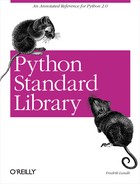The htmlib module contains a tag-driven HTML parser, which sends data to a
formatting object. Example 5-9 uses this module. For more examples on how to parse HTML files using
this module, see the descriptions of the formatter module.
Example 5-9. Using the htmllib Module
File: htmllib-example-1.py
import htmllib
import formatter
import string
class Parser(htmllib.HTMLParser):
# return a dictionary mapping anchor texts to lists
# of associated hyperlinks
def _ _init_ _(self, verbose=0):
self.anchors = {}
f = formatter.NullFormatter()
htmllib.HTMLParser._ _init_ _(self, f, verbose)
def anchor_bgn(self, href, name, type):
self.save_bgn()
self.anchor = href
def anchor_end(self):
text = string.strip(self.save_end())
if self.anchor and text:
self.anchors[text] = self.anchors.get(text, []) + [self.anchor]
file = open("samples/sample.htm")
html = file.read()
file.close()
p = Parser()
p.feed(html)
p.close()
for k, v in p.anchors.items():
print k, "=>", v
print
link => ['http://www.python.org']If you’re only out to parse an HTML file and not render it to an
output device, it’s usually easier to use the sgmllib module instead.
..................Content has been hidden....................
You can't read the all page of ebook, please click here login for view all page.
